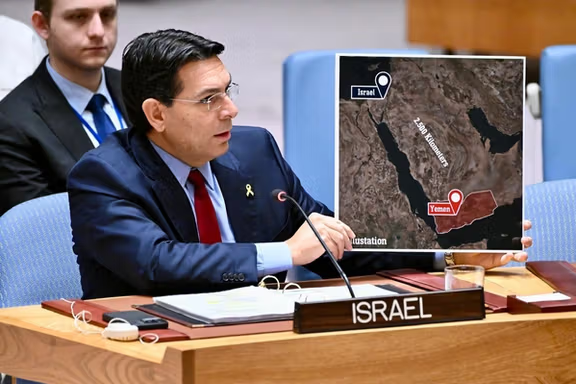UN Security Council holds Iran to account for Houthi attacks

The last United Nations (UN) Security Council for 2024 warned Iran about any further escalation by Tehran's allied armed group in Yemen, the Houthis.

The last United Nations (UN) Security Council for 2024 warned Iran about any further escalation by Tehran's allied armed group in Yemen, the Houthis.
The meeting was requested by Israel to discuss the Houthis' ongoing targeting of the country. Israeli UN ambassador Danny Danon demanded the Iran-backed militants halt their missile attacks or face consequences.
“This is not a warning,” said Danon, “It is a promise: the Houthis will suffer the same miserable fate as Hamas and Hezbollah."
In a press conference prior to the Security Council session, Iran International’s Maryam Rahmati asked the Israeli permanent representative to the UN if the escalations with the Houthis would increase the likelihood of a direct war with Iran.
In response, Danon did not rule it out and said Israel seeks peace but would prepare for all scenarios.
“I would say also to the Iranian leadership, we have shown our capabilities. We have the ability to strike every target in the Middle East, including Iran,” replied Danon.
It appears Israel may be paving a case to the UN security council for full assault on Yemen’s Houthis.
Since the launch of October 7, the Houthis have fired drones and missiles almost daily towards Israel, describing it as an act of solidarity with Palestinians in Gaza.
Earlier this month, a missile fired from Yemen breached Israel’s air defense systems, striking a playground near Tel Aviv which injured 16 people and damaged homes. The incident occurred only two days after a Houthi missile hit a school in Ramat Gan, the same school that Danon said he attended as a child.
"What would you do if it were your child? Your school? Your city?,” said Danon.
Israel responded by striking targets in Yemen, including Sanaa airport, ports on the west coast of the country, and two power plants. The head of the World Health Organization (WHO), Tedros Adhanom Ghebreyesus was about to board a plane at the airport when he said he had to run for shelter.
Engaging Iran to halt Houthis
Ambassador Danon presented a map showing the distance between Israel and Yemen, adding that Israel and Yemen do not share a border but that the Houthis are being used by Iran as a tool.
The skirmishes between Israel and Yemen are the direct result of Iran's actions against Israel, according to other key member states. Their message was to engage Iran to stop the Houthi operations.
"We can all see clearly that the Houthis are fully enabled by Iran to launch long range and deadly attacks on Israel, including civilian infrastructure, as evidenced by the Houthi's propaganda boasting about the use of advanced hypersonic missiles," US Ambassador Dorothy Shea told the council."
"Iran's provision of these and other lethal weapons to the Houthis violates the arms embargo imposed on the group by this council," she added.
The Deputy US Representative also called the UN to strengthen its verification and inspection mechanism on arms to prohibit any illicit smuggling.
Russian position
Russia, another key security member state, did not reference the Islamic Republic of Iran in its condemnation of the Houthis.
The Russian representative denounced the Houthi’s recent strike on Israel but said the narrative of blame has been one-sided, saying Israel’s action in Gaza are the root cause to the conflict.
“We shouldn't dismiss the broader context because many hotspots of tension today are provoked by the actions of Israel against Palestinians,” said Vasily Nebenzya, a permanent representative to Russia at the UN.
Japan's representative to the UN also mentioned Palestinians, asserting that Houthis' actions do nothing to help their cause and urging Iran to exercise its influence to halt the strikes.
The Washington Institute for Near East Policy's Maritime Attack Tracker recently tallied 106 confirmed Houthis strikes on shipping since November 2023.
The Houthis boast higher numbers and have seized two civilian ships and held another, killing at least four merchant seamen according to Michael Knights of the Washington Insititute who spoke at Monday’s security council session.
'Dangerous escalation'
UN Assistant Secretary-General Mohamed Khaled Khiari addressed the Security Council meeting with a warning that the Mideast is witnessing another dangerous escalation. He condemned attacks in Israel and Yemen.
Britain's representative expressed concern about Israel’s strikes on civilian infrastructure in Yemen, while taking aim at Iran for the Houthis' continued strikes against Israel and their targeting of international shipping in the Red Sea.
"(Iran's) long standing financial and military support to the Houthis has enabled and exacerbated Houthi aggression. Iran bears responsibility for the actions of its proxies, and it must cease its illegal activity, which is destabilizing the region and threatening international peace and stability," said Ambassador Barbara Woodward, UK Permanent Representative to the UN.